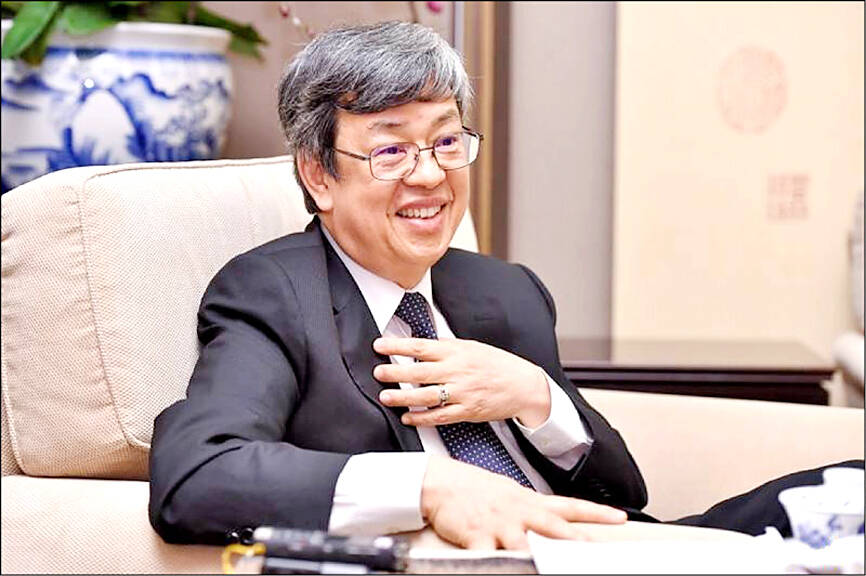The Presidential Office last night confirmed that former vice president Chen Chien-jen (陳建仁) would be the next premier, with a formal announcement to be made tomorrow.
The Chinese-language Liberty Times (the Taipei Times’ sister newspaper) yesterday published an exclusive report saying that Chen had accepted the nomination following a meeting with President Tsai Ing-wen (蔡英文) during the Lunar New Year holiday.
The nomination has to be approved by the Legislative Yuan, with opposition lawmakers vowing to scrutinize his performance if Chen was nominated.

Photo: Chung Li-hua, Taipei Times
Chen accepted the nomination because he believes the Democratic Progressive Party (DPP) must be united for the presidential election in January next year, the report said, adding that the new Cabinet must strive to deliver the best performance within a little more than a year to support the DPP’s presidential candidate.
“I would like to remind the next premier that people would only feel safe and secure if the new premier heeds public opinion, addresses the nation’s rising crime rate and protects the nation’s cybersecurity systems,” Chinese Nationalist Party (KMT) Cultural and Communications Committee head Hung Mong-kai (洪孟楷) said.
“I also hope that the new premier would select Cabinet members from among professionals and experts. He should not pick those who lost in the nine-in-one local elections or from a narrow circle of people,” Hung added.
KMT caucus whip William Cheng (曾銘宗) said that the public would have an even more negative view of the DPP administration if Chen were to lead the Cabinet.
Chen “lacks administrative experience, and he had favored Medigen Vaccine Biologics Corp (高端疫苗),” Tseng said, referring to the developer of a local COVID-19 vaccine, which has been a target of KMT criticism.
“He also made controversial comments while campaigning for other candidates during the nine-in-one elections last year. The KMT caucus will scrutinize his performance and carefully question him when the next legislative session opens next month,” Tseng said.
Taiwan People’s Party Legislator Jang Chyi-lu (張其祿) said Chen would have no “honeymoon” once his nomination is approved.
“The country is experiencing all sorts of problems, from strained cross-strait relations to skyrocketing housing prices, stagnant salaries, delays in US arms sales to Taiwan, and a decline in agricultural and fishery product exports. These issues will have to be addressed immediately once he becomes premier,” Jang said.
DPP Legislator Hsu Chih-chieh (許智傑) said Chen has a positive image as a public health expert.
“As the convener in charge of reforming the pension systems for military personnel, civil servants and public school teachers, Chen showed great communication skills. As a Catholic, he cares for the economically disadvantaged, and knows a lot of people in diplomatic and religious circles,” Hsu said.

SECURITY: As China is ‘reshaping’ Hong Kong’s population, Taiwan must raise the eligibility threshold for applications from Hong Kongers, Chiu Chui-cheng said When Hong Kong and Macau citizens apply for residency in Taiwan, it would be under a new category that includes a “national security observation period,” Mainland Affairs Council (MAC) Minister Chiu Chui-cheng (邱垂正) said yesterday. President William Lai (賴清德) on March 13 announced 17 strategies to counter China’s aggression toward Taiwan, including incorporating national security considerations into the review process for residency applications from Hong Kong and Macau citizens. The situation in Hong Kong is constantly changing, Chiu said to media yesterday on the sidelines of the Taipei Technology Run hosted by the Taipei Neihu Technology Park Development Association. With

CARROT AND STICK: While unrelenting in its military threats, China attracted nearly 40,000 Taiwanese to over 400 business events last year Nearly 40,000 Taiwanese last year joined industry events in China, such as conferences and trade fairs, supported by the Chinese government, a study showed yesterday, as Beijing ramps up a charm offensive toward Taipei alongside military pressure. China has long taken a carrot-and-stick approach to Taiwan, threatening it with the prospect of military action while reaching out to those it believes are amenable to Beijing’s point of view. Taiwanese security officials are wary of what they see as Beijing’s influence campaigns to sway public opinion after Taipei and Beijing gradually resumed travel links halted by the COVID-19 pandemic, but the scale of

A US Marine Corps regiment equipped with Naval Strike Missiles (NSM) is set to participate in the upcoming Balikatan 25 exercise in the Luzon Strait, marking the system’s first-ever deployment in the Philippines. US and Philippine officials have separately confirmed that the Navy Marine Expeditionary Ship Interdiction System (NMESIS) — the mobile launch platform for the Naval Strike Missile — would take part in the joint exercise. The missiles are being deployed to “a strategic first island chain chokepoint” in the waters between Taiwan proper and the Philippines, US-based Naval News reported. “The Luzon Strait and Bashi Channel represent a critical access

Pope Francis is be laid to rest on Saturday after lying in state for three days in St Peter’s Basilica, where the faithful are expected to flock to pay their respects to history’s first Latin American pontiff. The cardinals met yesterday in the Vatican’s synod hall to chart the next steps before a conclave begins to choose Francis’ successor, as condolences poured in from around the world. According to current norms, the conclave must begin between May 5 and 10. The cardinals set the funeral for Saturday at 10am in St Peter’s Square, to be celebrated by the dean of the College